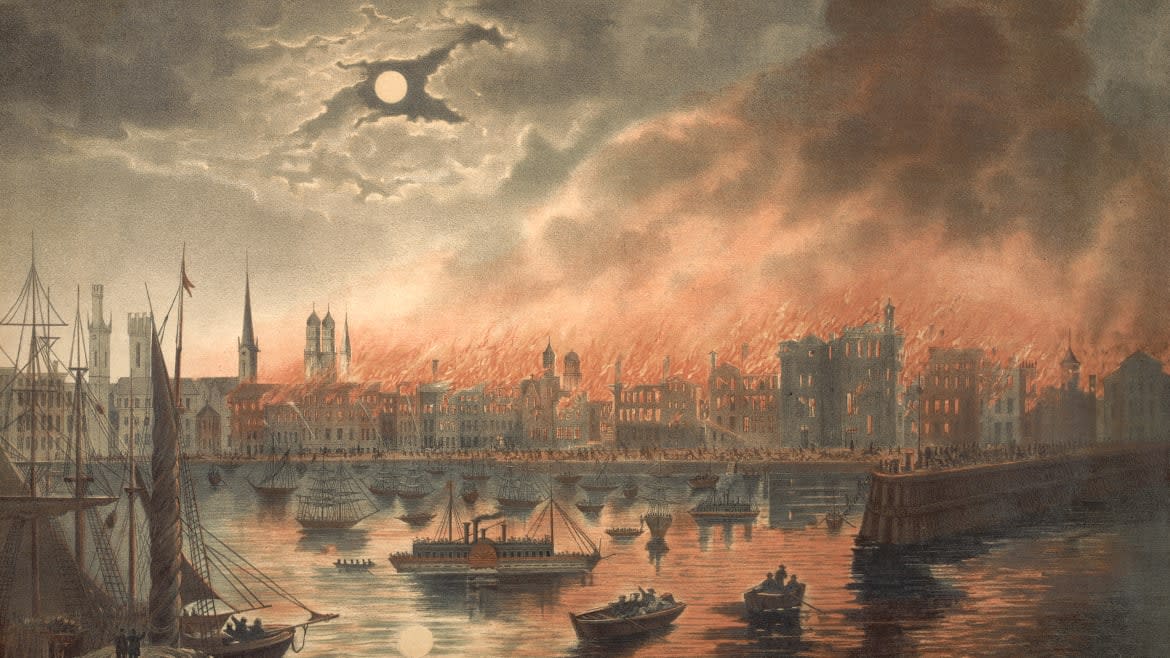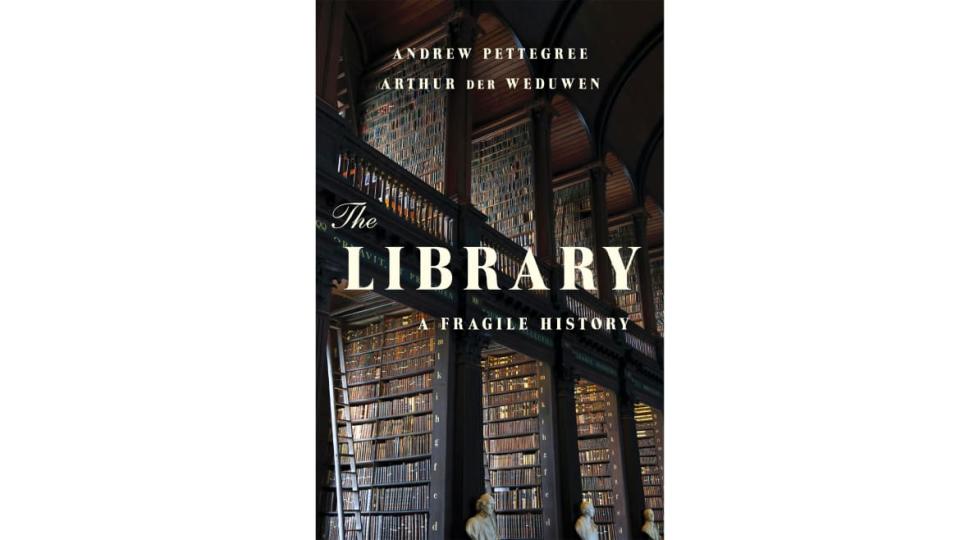When Chicago Turned Its Nose Up at Books From the Queen

- Oops!Something went wrong.Please try again later.
On the night of Sunday 8 October 1871, a fire began in Chicago that would change the face of the city. At this point Chicago was fast emerging as one of the wonders of the new industrial world, a nodal point of the transcontinental transport network and the food distribution centre of a hungry continent. A tough city, and magnet for immigrants from all over Europe, the wealth of the Chicago elite was nevertheless expended to supply the customary accoutrements of metropolitan sophistication: churches and civil buildings, the Chicago Academy of Sciences, the Chicago Historical Society (home to a collection of more than 165,000 books) and the Illinois Library Association. The fire, which raged unchecked through all of Monday, swept all of this away, along with 17,450 homes, rendering 95,000 people homeless.
Almost incidental to this enormous human suffering were the losses to the libraries: contemporary estimates, incorporating fifty fine private libraries, suggested losses of up to 3 million volumes, and this may be conservative. The lost stock of the Chicago booksellers was valued at $1 million. The premises of the publishers of nine daily newspapers and over a hundred periodicals were also laid waste.3
The extinction of Chicago, through this single savage act of fate, touched off an enormous wave of sympathy on both sides of the Atlantic. English efforts focused on the creation of a new free public library for Chicago, something which to this point had been lacking. The campaign, chaired by Thomas Hughes, a member of parliament and the author of Tom Brown’s Schooldays, gathered 8,000 books, with donations from Prime Minister Gladstone, his great adversary Benjamin Disraeli and Queen Victoria. Disraeli’s presence in the list of sponsors is particularly noteworthy, since as a popular author he had suffered grievously from the American disregard for British copyright law. All the English donations were accompanied by a neat book label making reference to this humane act of solidarity, all the more remarkable since England was simultaneously contributing to the reconstruction of the Strasbourg library after German bombardment. The books proved a great success with Chicago’s library-goers, and especially collectors of book plates, since of the original 8,000 books only 300 now survive; unless as the first historian of the library tactfully suggests, they were all "worn out in general use."
If these proud Victorians patriarchs thought they had earned the lasting gratitude of the citizens of Chicago, they had reckoned without Big Bill Thompson. A vehement critic of prohibition and proud friend of the gangster Al Capone, Big Bill blazed an eccentric trail through Chicago politics as the city’s mayor. Forced out of office once, in 1927 Big Bill planned his comeback with a novel rallying cry. Should the King of England visit Chicago, he pledged, Big Bill would punch him on the nose. The inoffensive George V had no plans to visit the United States, so the threat was somewhat moot, but the pledge struck a sufficient chord with Chicago’s electorate and Big Bill returned triumphant to City Hall.

King George’s nose remained intact, but Mayor Thompson’s one-sided feud was not over. He now announced that the city library must be purged of pro-British literature. Since the mayor was simultaneously engaged on hounding out of office the supervisor of schools, this task was delegated to one of his appointees, Urbine ‘Sport’ Herrmann. The director of the public library, Carl Roden, offered only tepid resistance. Noting that identifying all books expressing anti-American sentiment would be a huge task, he offered instead to remove them from general circulation to the safety of the library’s closed reserve. In the event, the books were saved by Herrmann’s indolence. Having checked out four books flagged up by the Patriots League, he found the task of locating the offensive passages beyond his capacities, and tamely returned them the following day.
This and subsequent attempts to purge the Chicago library collection emphasized the need for a more robust statement of the library’s commitment to free speech. The result was a terse document, drafted by the American Library Association, rather sententiously titled the Library Bill of Rights, affirming first and foremost the librarian’s inalienable right to choose what books should enter the collection. Published in 1939, as storm clouds gathered over Europe, and revised frequently since, it offered a fragile defense for the idea that libraries should be the sanctuary for literature representing all strands of opinion. Not all librarians were destined to be the heroic defenders of this principle. Carl Roden, who had frankly acknowledged in 1927 that he would surrender disapproved books if ordered to do so, was the following year elected chair of the ALA. His colleague, Frederick Rex of the Chicago municipal reference library, went one better, personally purging the collection of all material of a pro-British character. Now, he announced proudly, "I have an America-First Library."
Excerpted from The Library: A Fragile History by Andrew Pettegree and Arthur der Weduwen. Copyright © 2021. Available from Basic Books, an imprint of Hachette Book Group, Inc.
Get our top stories in your inbox every day. Sign up now!
Daily Beast Membership: Beast Inside goes deeper on the stories that matter to you. Learn more.

